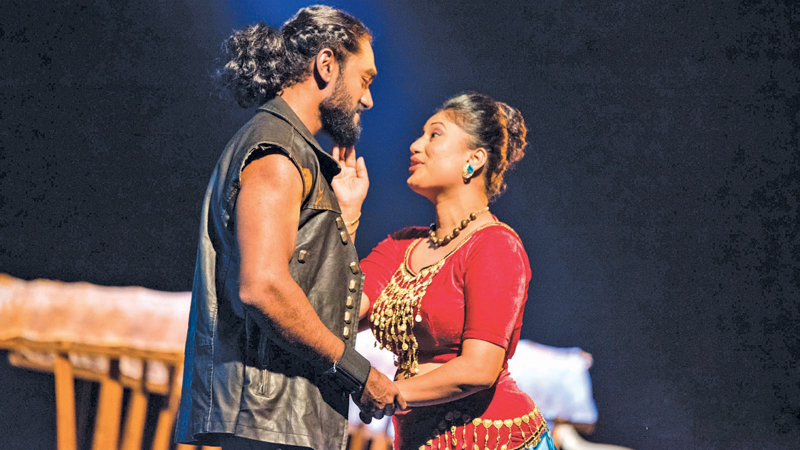In my second dream, thus addressed King Kosol to his sole holy audience, the Buddha, to puzzle out some mysterious visions he had in sleep. Small trees and shrubs burst through the soil and grown hardly a span or two high when they suddenly bore flowers and fruits. The king had 15 more dreams vivid in imagery. Mighty bulls making a big show of fighting only to leave the battle empty-handed, elderly cows suckling from baby calves, the young calves forced to pull heavy wagons to no avail, two-headed horses fed fodder on both mouths, old jackals relieving themselves on a gold bowl and so on. In response to each and every dream, the Buddha comforts the monarchy assuring the effect of such dreams would materialize only in a future period when the world will fall into decay and shrunken human life-span.
Whether this Jataka-book incident has a genuine historic accreditation or not, keep that argument aside. The mythical, philosophical and aesthetic element of the 16-dream long narrative has inspired Professor Ariyaratne Atugala to sign in his latest theatrical endeavour, Maha Supina. The play will be staged at the Nelum Pokuna Mahinda Rajapaksa Theatre on November 16 at 6.30 pm. The lotus pond-configured theatre designed for swanky productions is no novel experience for Atugala whose previous production, Mahasamayama, had over 10 runs at the same premises.
Mahasupina is Professor Atugala’s teaching-learning project introduced for the Mass Communication undergraduates of Kelaniya University.
“The prevailing classroom teaching methodology is coarse. The knowledge acquisition is there, no doubt, but not to a practical height. This phenomenon kind of forced me to initiate this teaching-learning project. The inspiration was already present as my guru, Professor Sunanda Mahendra, has brought forward several theatre productions as teaching-learning projects,” Atugala makes his objective clear.
The play features a cast of seasoned performers as well in addition to the undergraduates. Among them are Akhila Danuddara, Saranga Disasekara, Nissanka Diddeniya, Madani Malwatta, Sulochana Weerasinghe, Buddhadasa Withanarachchi and Janaka Ranasinghe, with Ravibandu Vidyapathi and Tharupathi Munasinghe handling choreography and music.
The professional-undergraduate combo serves a purpose.
“If I cast only undergraduates, they will acquire only my knowledge. Now, they have the opportunity to work with the veterans. On this platform, our undergraduates will learn quite a lot of things directly as well as indirectly. I remember some undergraduates could not even improvise the scripted dialogues. Within a few months working with the veterans, they befit even the lead roles,” the academic turned thespian makes a case for his casting.
The journey from the basic amenities of Kelaniya University Dharmaloka Hall, where the production was previously staged, to the plush atmosphere of Nelum Pokuna has brought in quite a few marked differences. Video mapping, executed for the first time in Sri Lanka’s theatre history, will be employed at the Nelum Pokuna. Sound system and stage management are two more remarkable aspects. The undergraduates bogged down by the exhaustive confines of the traditional theatre will enjoy ample freedom before a wider spectacle.
The academia and the external society mourn a gulf to an ivory-tower proportion. Universities, the most sacrosanct of the academic institutions, teach art, whereas the external society practises the same. Ariyaratne Atugala reminds us that it should not be so. The mass communication professor admits that there could be a conflict of interests when he chooses to become a thespian when theatre arts are taught as a separate subject.
“But then again, theatrical arts cannot be confined to a subject territory. Ediriweera Sarachchandra, for instance, was a linguistic expert who used his academic prowess to usher in a fresh lease of life to the vernacular theatre. Jothipala and Khemadasa marked their niche as professional artistes but they belong to no school as such,” comments Atugala, entering into details.
Art is a right of any citizen. Any citizen has a right to engage in art.
That said, Atugala also wants to introduce theatre as a secondary unit to the mainstream subject, mass communication, to inculcate creative spirit among the undergraduates. The undergraduates interested in theatre will be able to grab that opportunity to kindle their aesthetic spirit. Atugala firmly believes that the theatre provides ample opportunity to personality development and tension management. Improvisation provides room to develop one’s personality.
Above all else, what ails the local theatre is the poor presentation. Lack of a proper national programme has made it worse. The global theatre has gone so long, which is something we cannot turn a blind eye on.
“We have been used to the mobile theatre more than enough. We should move on. The developed countries have theatres enjoying a regular influx of spectators. Our own Nelum Pokuna must be privileged with a similar phenomenon. For instance, the followers of God Katharagama make it a point to visit his sacred site at any cost. They do it with utmost reverence and affection towards the god,” Atugala offers an explanation.
The intrusion of cinema, television, internet and ultimately the smart devices held on palms would not affect the stage according to the mass communication professor. He has his own experience to support his claim.
“Within one year and three months, we had Mahasamayama on Nelum Pokuna over ten times attracting a sizeable audience each time. The audience included expatriates and foreigners as well,” Atugala explained. We will never grow tired of theatres, yet, Professor Atugala is quick to add, the artistes of this day must look upon the technical aspect as well. Theatre has grown to many proportions along with the inevitable technological expansion. That is something no artiste can afford to overlook.




Add new comment